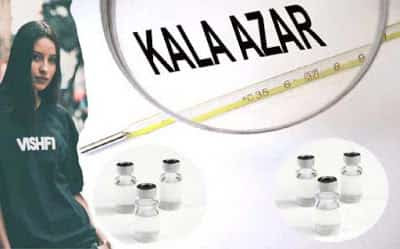WHAT IS KALA AZAR/ Leishmaniasis ?
Kala-azar or Leishmaniasis is a protozoal disease triggered by Leishmania donovani and transmitted by the sandfly - phlebotomus argentipes and characterised by irregular fever , enlargement of liver and spleen, anaemia, leucopenia, vomiting, diarrhea, cough, night sweats, dark skin, thinning hair, abdominal pain, weight loss, significant immune dysfunction, and emaciation.
Kala-Azar is a fatal infection and major public health problem in certain part of India and about two million people affected on a yearly basis, hence appropriate protection and preventive methods as well as sanitation are essential in protecting against the spread of the disease. Kala-Azar is well known with different titles as Visceral leishmaniasis, Black Fever, Black sickness, Black Disease, Dum Dum Fever, Espundia, and Sand fly Disease and its own incubation period is 2 - 4 months.
Signs and Symptoms of Kala-azar
Loss of appetite.
Recurrent fever (irregular prolonged fever) and night sweats.
Hyper pigmented skin (dry, dark, scaly skin) of the forehead, abdomen, hands, and feet (Patient may show grayish appearance).
Anemia - low red blood cell count.
Leukopenia - low white blood cell count
low platelet count.
Hepatomegaly - Enlargement of the liver.
Splenomegaly - Enlargement of the spleen.
Giddiness.
Cough.
Abdominal pain / stomach-ache.
Thinning hair.
Progressive emaciation and weight loss.
Malaise.
Occasional Bleeding.
Diarrhea and vomiting.
Diagnostic investigations in Kala-azar
Aldehyde test.
Sternal or splenic puncture test - Bone marrow smear examination. It is common practice to examine smears of bone marrow and of blood in the search for organisms. The bone marrow is usually taken from the sternum, or splenic puncture is sometimes carried out as an alternative which is said by some to be more reliable in conditions where the parasites are scanty.
Ayurvedic and Allopathic treatment
The Ayurveda can treat kala-azar. There are certain effective medicines in Ayurveda that can treat Kala-azar and also take away the root cause of the disease.
Mukta Bhasma.
Tamra Bhasma.
Sphatik-Bhasma.
Abhrak-Bhasma
Trivang-Bhasma.
Suvarna-Bhasma.
Shuddha Nilanjan (antimony).
Praval Bhasma.
Shuddha Swar nagairika.
Shankha Bhasma.
Geloy (Tinospora cordifolia), Vasa (Justicia adhatoda), Naagkeshar (Messua ferrea), Ashwagandha (Withania somnifera), Shatavari (Asparagus racemosus), Bala (Sida cordifolia), Naagbala (Grewia hirsuta), Tulsi (Ocimum sanctum), Bhrungraj (Eclipta alba), Garlic (Allium Sativum), Ghrita kumari (Aloe barbadensis), Arandi (Ricinus communis), Kutki (Picrorhiza kurroa), Daru haldi (Berberis aristata), American aloe (Agave americana), Gatta (Agave angustifolia)
Allopathic drugs for kala-azar
Antimony - Antimonial drugs are the basis of specific treatment. Sodium or potassium antimony tartrate will be the only useful trivalent compounds.
Pentavalent antimony - It really is a drug of choice for treating kala azar.
Dosage - 4 - 6 gms. for full course.
Side effect - Anaphylactic shock, joint pain, abdominal pain, nausea, vomiting, diarrhoea, coughing.
Contra indication - Renal and hepatic impairments like jaundice, cirrhosis of liver, nephritis.
Urea stibamine - A course of 10 injections i.v. stat every alternate days or twice a week. Total 2 gms. for adults and other antimony arrangements such as Pentamidine isethionate 4 mg per kilogram for just two days in resistant conditions or Neostibosan is useful in children cases.
It can be prevented with spray of insecticides like DDT to destroy sandfly. By elimination of breeding places like poultry or cattlesheds.
**************************************************************
Article By - Rajesh Kumar
**************************************************************
YOU MIGHT ALSO LIKE
How to Prevent and Treat Malaria
**************************************************************














No comments:
Post a Comment